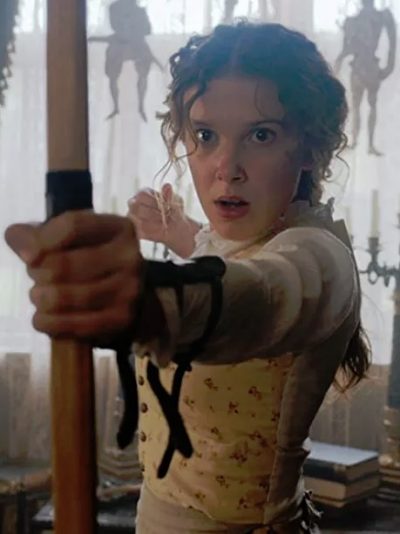★★
“Puts the ‘no’ in Enola.”
 Complete ranking of Enolas
Complete ranking of Enolas
- Enola Gay
- Enola Holmes
- That’s it.
I’m probably not the only one who spent much of the film humming OMD’s classic Enola Gay to themselves – released 40 years ago this month, coincidentally. And, sadly, it remains my favourite Enola, by quite some distance. This was more annoying than anything else, though I’ve never been on the Millie Bobby Brown hype-train. I didn’t think much of Stranger Things, and her performance in Godzilla: King of the Monsters, interfered with what I want to see i.e. monsters fighting. Here, I found her more irritating than engaging, though in her defense, she wasn’t helped by some poor directorial choices.
This get off on the wrong foot at the very start, Enola (Brown), Sherlock Holmes’ sixteen-year-old sister, breaking the fourth wall and addressing the audience, something she does frequently. Director Bradbeer used this technique in TV series Fleabag, but I’m not a fan: it takes me out of proceedings, reminding me I’m watching a film. What follows is less a convincing evocation of 1900 England, than contemporary America playing girl power dress-up, with “nasty women” blowing things up as they seek to defeat the evil patriarchy. One of these is Enola’s mother (Bonham-Carter), whose vanishing without warning starts things off, causing Enola to begin searching for her, based on coded clues left behind. It escapes me quite why the missing parent couldn’t simply write, “Dear Enola, Gone off to be a suffragette. Love, Mum.”
Not that it matters, because Enola rapidly abandons this quest entirely, in favour of a case involving the young, attractive and entirely personality-free aristocrat, Viscount Tewkesbury (Partridge), whose vote is crucial to get a reform bull passed, expanding the ability to vote [in reality, no such change took place until almost twenty years later – but hey, why let facts stop you from twisting history for your political points?]. On his trail is a mysterious and ill-intentioned man (Gorman), with whom Enola crosses paths. She also has to fend off attempts by her other brother, Mycroft, to have her consigned to a very Handmaid’s Tale-looking boarding school. This is intended to have Enola brainwashed into being the quiet and submissive woman society expects.
The politics on view here are cringeworthy, particularly from Mrs. Holmes, who speaks almost entirely in feminist fortune-cookies, such as “Don’t be thrown off course by other people. Especially men.” It’s one of those cases where merely leading by example isn’t enough: you have to virtue-signal your morality by announcing it, explicitly and repeatedly, which I find immensely off-putting. Hence, we get gobbets of political sermonizing, such as Sherlock (Cavill) being told, by a black, female martial-arts teacher – something I’m fairly sure wasn’t common enough in the Victorian era to pass without comment: “You don’t know what it is to be without power. Politics doesn’t interest you… because you have no interest in changing a world that suits you so well.” You go, sister!
Speaking of which, the portrayal of the great detective is no more accurate than the other element. “Sherlock Holmes always works alone!” proclaims Inspector Lestrade. Uh, I guess the creators never heard of Dr. Watson, an intrinsic character, from the very first Conan Doyle story? You just never get any sense of keen intellect from Cavill’s performance. Guess they didn’t want to overshadow Enola and her Big Brain. Yet, under all these flaws, is a decent movie, trying to get out. The look of things is lovely, and some of the action sequences are well-handled, even if a slip of a girl like Enola hardly seems equipped to trade blows with grown men.
Maybe they could have made more use of her archery skills (above), which are set-up, then entirely forgotten. Like so much else, that gets lost in the rush to cram an “uplifting” message into the movie, rather than letting one flow organically from it.
Dir: Harry Bradbeer
Star: Millie Bobby Brown, Louis Partridge, Henry Cavill, Burn Gorman




